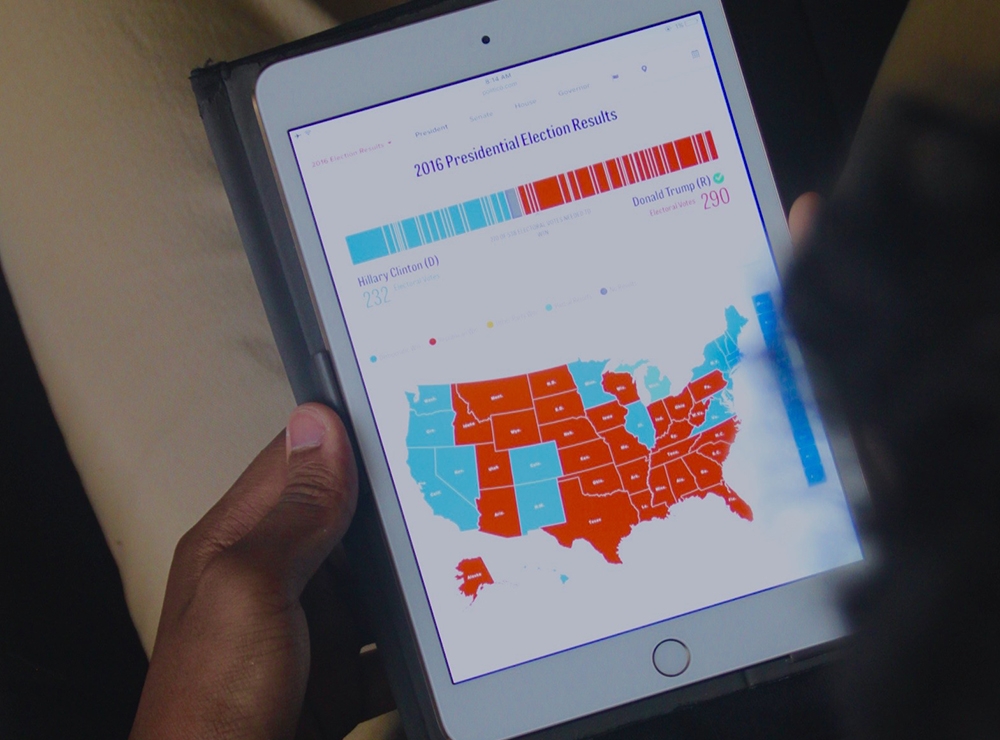Angelica Babiera | Staff Writer
Featured image: Voters are outraged at the seemingly faulty electoral system that named Donald Trump the 45th president of the United States. | Victoria Fung
After Donald Trump was announced as the new president of the United States, social media users expressed their outrage and shock at the election results. On the day of the election, I was scrolling through my Twitter and Facebook timelines to see what people were saying. Most had similar thoughts: How did this happen? How did he win?
Many users seem to think that Trump’s victory was due to the rich, middle-class, white South. Even The Guardian seems to concur.
Trump’s views played an important role to his campaign. He continuously preached acceptable racism, with talk of building a wall and refusing to let refugees into the country. These seemingly extremist views took the world by storm, and even those who were not American citizens were outraged by his statements.
“How can you vote for someone who does not like the majority of the American people? [Much] of the population includes blacks, Latinos, Muslims and Asians. It scares me to think that Muslims […] will be extremely marginalized and oppressed in one of the most powerful nations in the world,” says second-year criminology student Medina Torlak.
According to political science professor Rodney Loeppky, white Southerners were just one facet of the win. It’s actually the electoral colleges that played a huge role in Trump’s victory. “It is the strategic basis on which presidential campaigns are arranged in the United States, and it dictates how and where campaign finances are directed,” he says.
Electoral votes are the core of the election: the candidate with the most electoral votes, based on the majority for each state, is named president, even if the results do not agree with the popular vote, which totals all votes across the country.
“Conversely, it has a considerable effect on voter turnout, with those states understood to be locked in for either party witnessing depressed participation rates,” says Loeppky.
Since Democratic candidate Hillary Clinton actually won the popular vote, people want to see a reform of the electoral college system.
“[It] would both enhance participation and lead to more just outcomes. But whatever I think, the task of eliminating or even altering the electoral college is gargantuan, because it would require an extensive constitutional amendment, which is exceptionally difficult even in the most opportune circumstances. The current political terrain in the United States is anything but opportune, and the possibility for reform, absent a mass movement, cutting across all social classes and regions is zero,” says Loeppky.
With Canadians on social media touting their citizenship and chastising Americans over this complex system, it is important to acknowledge reality. The current electoral system in Canada has also come under fire for not being equitable, leading groups like Lead Now to introduce a campaign to promote a more equitable voting system.
“[The electoral] college effectively is a first-past-the-post system, taken to a state-wide level. It creates all of the same problems in terms of representation, voter turnout and apathy, [as well as] limited party participation. We like to scoff at the electoral college in the United States, but our own electoral system operates on basically the same principles in the election of our legislatures and government.
“The move to reform would probably need to erupt at the local level in both jurisdictions. Major electoral reform requires accurate understanding on the part of those affected—voters. And from the standpoint of the major parties, opening up the system to a more proportional reflection of actual votes will not benefit them. As such, campaigns around electoral reform are often imbued with inaccuracies, misleading statements or even outright falsehoods,” says Loeppky.
History plays an important role in how these voting systems are constructed. Originally, electoral colleges were implemented to protect the voice of rural voters. Similarly, first past the post was created to protect voter representation and provide voters with a direct link to their representative. When looking into electoral system reform, it’s important to ensure representation and equality are included, as well as basic principles of democracy.
Ultimately, Trump won fair and square. To blame the electoral college on his win is unfair, because every president elected before him also won with this system. Although some of Trump’s supporters are viewed as radical racists, people still believed his rhetoric could actually help the American nation—not by building a wall, but by expressing the truth that most Americans were afraid to voice, which could possibly make America great again.




